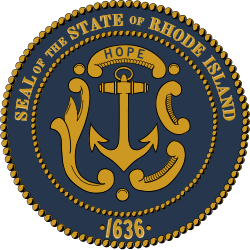| |||||||||||
| |||||||||||
| |||||||||||
The 1789 Rhode Island gubernatorial election was an uncontested election held on April 1, 1789, to elect the governor of Rhode Island. John Collins, the incumbent governor, was the sole candidate and so won with 100% of the vote. [1] [2]
| |||||||||||
| |||||||||||
| |||||||||||
| Elections in Rhode Island |
|---|
 |
The 1789 Rhode Island gubernatorial election was an uncontested election held on April 1, 1789, to elect the governor of Rhode Island. John Collins, the incumbent governor, was the sole candidate and so won with 100% of the vote. [1] [2]